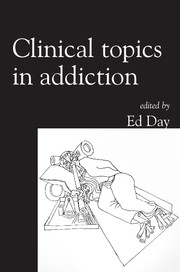Book contents
- Frontmatter
- Contents
- List of tables
- List of boxes
- List of figures
- List of contributors
- Foreword by Nat Wright
- Preface
- 1 What works in drug addiction?
- 2 The development of the drug treatment system in England
- 3 Stimulant use still going strong
- 4 Adverse effects of khat: a review
- 5 What the clinician needs to know about magic mushrooms
- 6 What works in alcohol use disorders?
- 7 Management of alcohol detoxification
- 8 Nicotine addiction and smoking cessation treatments
- 9 Pathological gambling: an overview of assessment and treatment
- 10 Use of investigations in the diagnosis and management of alcohol use disorders
- 11 Laboratory investigations for assessment and management of drug problems
- 12 Pharmacotherapy in dual diagnosis
- 13 Dual diagnosis: management within a psychosocial context
- 14 Treating depression complicated by substance misuse
- 15 Treating anxiety complicated by substance misuse
- 16 An overview of psychological interventions for addictive behaviours
- 17 Motivational interviewing
- 18 Substance misuse in adolescents
- 19 Management of drug misuse in pregnancy
- 20 Intoxication and legal defences
- 21 Substance misuse and violence: the scope and limitations of forensic psychiatry's role
- 22 Literary and biographical perspectives on substance use
- Index
Foreword by Nat Wright
Published online by Cambridge University Press: 02 January 2018
- Frontmatter
- Contents
- List of tables
- List of boxes
- List of figures
- List of contributors
- Foreword by Nat Wright
- Preface
- 1 What works in drug addiction?
- 2 The development of the drug treatment system in England
- 3 Stimulant use still going strong
- 4 Adverse effects of khat: a review
- 5 What the clinician needs to know about magic mushrooms
- 6 What works in alcohol use disorders?
- 7 Management of alcohol detoxification
- 8 Nicotine addiction and smoking cessation treatments
- 9 Pathological gambling: an overview of assessment and treatment
- 10 Use of investigations in the diagnosis and management of alcohol use disorders
- 11 Laboratory investigations for assessment and management of drug problems
- 12 Pharmacotherapy in dual diagnosis
- 13 Dual diagnosis: management within a psychosocial context
- 14 Treating depression complicated by substance misuse
- 15 Treating anxiety complicated by substance misuse
- 16 An overview of psychological interventions for addictive behaviours
- 17 Motivational interviewing
- 18 Substance misuse in adolescents
- 19 Management of drug misuse in pregnancy
- 20 Intoxication and legal defences
- 21 Substance misuse and violence: the scope and limitations of forensic psychiatry's role
- 22 Literary and biographical perspectives on substance use
- Index
Summary
In his preface, Ed Day highlights that this book originated in articles written in the peer-reviewed psychiatry literature for a generic audience of consultant psychiatrists. This stimulated me to think whether the book will serve as a useful tool for my generic psychiatry colleagues. Our paths frequently cross as in our daily professional lives we constantly encounter problems relating to problematic drug or alcohol use. I am convinced that this book is a ‘must have’ for every consultant psychiatrist. However, the value of this book is for a much wider audience. I reflected upon how it would feel to be a junior doctor considering a career in addiction psychiatry. Would this book reassure me that it is possible to pursue a fulfilling career in providing professional, evidence-based clinical care to people whose drug use has become a problem to themselves, their families and wider society? Without doubt I am sure that it does have the potential to fulfil such a function. There are few books that offer both a wide scope (breadth) and an exhaustive reservoir of knowledge (depth) by combining the current evidence base with diverse expert clinical knowledge and experience. This book has managed to achieve these aims in a style that is readable, engaging, yet authoritative
There is another readership, however, to whom I would unreservedly recommend this book, namely that of my own professional peoplegroup, primary care clinicians. One of the chapters alludes to the recent growth in primary-care-based drug treatment and another points out that, although psychiatry services for those with mental ill-health and drug dependence are largely separate, in primary care such comorbid conditions are managed by the same clinician. If primary care has traditionally offered the drug treatment field strengths of pragmatism and integrated clinical care for those with comorbid conditions, then there is much that we can receive in return from our colleagues in specialist addiction psychiatry services. This book offers us an authoritative collection of the evidence, and I would like it to sit on the bookshelves of all my primary care colleagues who have clinical responsibility for those who use drugs in a problematic fashion.
- Type
- Chapter
- Information
- Clinical Topics in Addiction , pp. xvii - xviiiPublisher: Royal College of PsychiatristsPrint publication year: 2007

